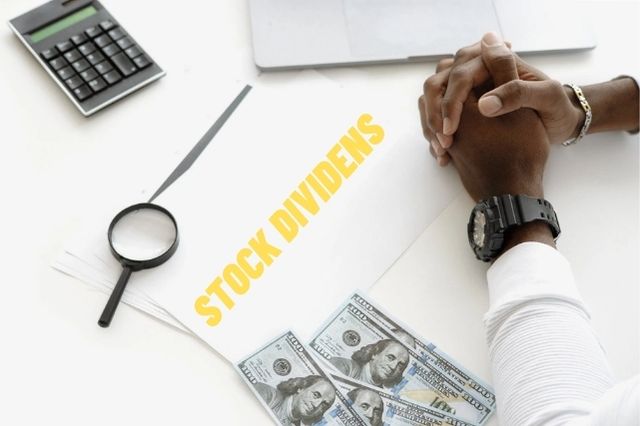
What Are Stock Dividends?
The stock market is a collection of markets where stocks (pieces of ownership in businesses) are traded between investors. It usually refers to the exchanges where stocks and other securities are bought and sold. The stock market can be used to measure the performance of a whole economy or particular sectors.
When you buy stocks in a company, you become a part-owner in that company. If the company does well, the stock prices will go up, and you will make money. If the company does poorly, the stock prices will decrease, and you will lose money.
The term DIVIDENDS is significant if you are going to invest in the stock market or have invested your money in the Stock Market or any stocks of any company. If you didn’t know about this thing, read this article at the end to learn What Are Stock Dividends?
What Are Stock Dividends?
A stock dividend is a payment made by a corporation to its shareholders out of its profits. The payment may be in the form of cash, additional shares of stock, or other property.
When a company declares a dividend, it specifies the amount to be paid, the record date, and the payment date. The dividend amount is usually a fixed percentage of the par value of the shares. For example, a company might declare a dividend of $0.50 per share.
Dividends are a distribution of a company’s earnings, decided by the board of directors, to a class of its shareholders. When a company earns a profit, it can either reinvest the money back into the business or pay it out to shareholders as a dividend.
What are Record Date and Ex-Date?
Record date and ex-date are two important dates for stockholders regarding dividends. The record date is when a company determines who its shareholders are to pay dividends. It is also the day when a company becomes aware of which shareholders own its stock. The record date is usually set a few days before the dividend payment date.
The ex-dividend date is the first day on which a shareholder is not entitled to receive a dividend payment. It is also the first day when a new shareholder’s stock purchase is not eligible for the previous dividend payment. The ex-dividend date is generally two business days before the record date.
What is Dividend Yield?
The dividend yield is the percentage of a company’s stock price that is paid out as dividends over the course of a year. It is calculated by dividing the annual dividend payment by the current stock price.
A high dividend yield indicates that a company is paying out a large percentage of its stock price as dividends. This can be a sign that the company is not doing well and is in danger of going bankrupt. A low dividend yield indicates that a company is not paying out very much of its stock price as dividends.
The dividend yield is simply the percentage of the dividend paid out annually concerning the stock’s current market price. For example, if a company pays a $0.50 dividend and the store sells for $10 per share, the dividend yield would be 5%.
The dividend yield is an important metric to look at when you decide whether or not to invest in a stock. A high dividend yield means that you will likely receive a high dividend..
How a Stock Dividend Works?
When a company earns a profit, it has the option to either reinvest that money back into the company or give some of it back to shareholders as a dividend. A dividend is a payment made to shareholders out of the company’s profits. The amount of the dividend is usually based on how many shares of stock the shareholder owns.
A cash dividend is paid in cash, while a stock dividend means the shareholder receives additional shares of stock. Most dividends are paid quarterly, although some companies pay dividends annually or semiannually.
The dividend payout usually occurs once or twice a year, and the amount that shareholders receive is based on how many shares they own. The company’s stock price usually drops by the amount of the dividend payout when it’s announced, but it usually bounces back shortly afterwards.
Types of Dividends
#1. Cash dividends
Cash dividends are payments that a company makes to its shareholders from its profits. The company’s board of directors decides how much money to pay out in dividends and when to pay them. Dividends can be paid in cash or stock, depending on the company’s preference.
#2. Stock dividends
A stock dividend is a payment made to shareholders out of the profits of a company. The payment can be in the form of cash, additional shares, or other assets. Dividends are usually paid on a regular schedule, such as quarterly or annually.
#3. Dividend reinvestment programs (DRIPs)
Dividend reinvestment programs, also known as DRIPs, are a way for investors to automatically reinvest their dividends into more shares of the company they are investing in.
This can be done through the company itself, or through a dividend reinvestment plan (DRP) provider. DRIPs allow investors to compound their returns over time and buy more shares with each dividend payment. This can be a great way for long-term investors to grow their portfolio, since it allows them to purchase more shares without having to come up with the money themselves.
#4. Special Dividend
A special dividend is a dividend payment made by a company to its shareholders that is in addition to, and separate from, the regular quarterly dividend payments. Special dividends are typically paid out in response to an event such as the sale of a major asset, a large one-time profit, or a change in company ownership.
#5. Preferred Dividends
Preferred dividends are a type of dividend that is paid to shareholders before any other dividends are paid. This type of dividend is usually paid out on a fixed schedule, and the shareholder has a right to receive it before any other shareholders. Preferred dividends are also usually cumulative, meaning that if the company misses a payment, the dividend will be added to the next payment.
Why To buy dividend stocks?
There are a number of reasons to buy dividend stocks. The number one reason is that you want to receive a regular income stream from your investments. Dividend-paying stocks can provide you with a steady monthly or quarterly payout, which can help you to better budget your finances.
Another reason to buy dividend stocks is that they can offer you stability and security in tumultuous markets. When the stock market takes a tumble, dividend stocks tend to hold their value better than non-dividend paying stocks. This makes them a safer investment during times of volatility.
Dividend stocks also tend to be more stable than other types of stocks, and they can offer investors a sense of security in turbulent markets.
Additionally, dividend stocks have the potential to outperform the market. And, when you reinvest those dividends, you can actually see your holdings grow at a much faster rate than if you just left the money in a regular savings account.
Disadvantages of dividend stocks?
When it comes to dividend stocks, there are a few key things you need to know. First and foremost, you need to understand the difference between a common stock and a dividend stock. With a common stock, the company doesn’t have any special obligations to shareholders, but with dividend stocks, the company is obligated to pay out a certain percentage of its earnings as dividends.
One disadvantage of dividend stocks is that they can be less volatile than other types of stocks. This can be good or bad, depending on your investment goals. If you are looking for high returns and are willing to take on more risk, you may want to avoid dividend stocks.
Dividend stocks can be a great way to generate income and grow your portfolio over time. However, there are a few things to keep in mind when investing in dividend stocks.
Another is that not all companies pay dividends. You’ll want to make sure the company you’re investing in has a history of paying dividends and that it is financially healthy enough to continue doing so.
Also, dividend stocks can be more volatile than other types of stocks. This is because a company’s decision to pay or not pay a dividend can be impacted by a variety of factors, such as the company’s earnings, cash.
Conclusion
So, it is the overview of Stock Dividends that you should know about before buying any stocks. Stock dividends can provide a steady stream of income for investors. They are payments made to shareholders out of the company’s profits. The amount of the dividend is usually a fixed percentage of the stock’s price.
Dividends are important because they represent a company’s financial stability. They are also a good indicator of how a company is doing overall. When a company pays a dividend, it is essentially saying that it is doing well and has money to spare.
